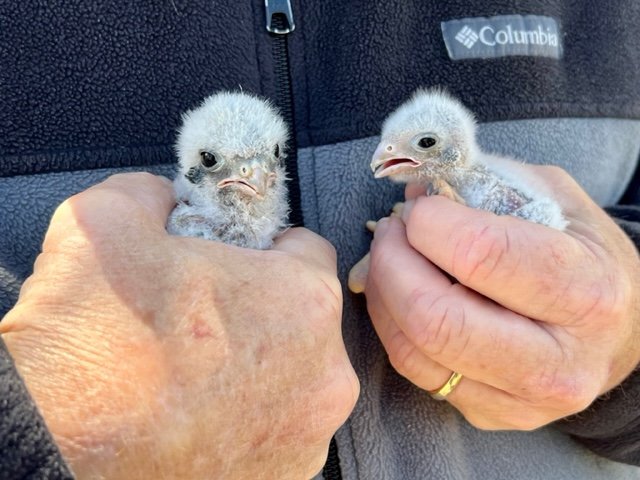Bend’s Think Wild, E. Cascades Audubon Society find foster parents for orphaned kestrel chicks

BEND, Ore. (KTVZ) -- A week ago, Bend wildlife center Think Wild received a call about two nestling American Kestrels who had accidentally been transported with a bale of hay from Burns to a farm in Tumalo. The mother was not present, so the finder brought the two nestlings to Think Wild for care.
Upon intake, Think Wild staff determined that these two nestlings were about 10 days old and in good body condition. Think Wild staff provided heat support and food to the young kestrels, and then immediately contacted the East Cascades Audubon Society to try and identify potential foster parents.
ECAS manages a kestrel nest box monitoring project, in which they install and monitor American Kestrel nest boxes throughout Central Oregon. Since kestrels will readily foster orphaned nestlings as long as they are similar in age to their own young, Think Wild requested that ECAS check their boxes for active nests with young nestlings.
On Monday, Think Wild Volunteer Gary Lauder transported the two kestrel nestlings to Crooked River Ranch, where ECAS confirmed that a kestrel family had established a nest with three healthy nestlings. This nest was selected because of the health and number of existing nestlings - kestrels will typically have about five young, so this brood will not overwhelm the hardworking adult birds who care for them.
Think Wild said Tuesday it anticipates that all five young kestrels will fledge the nest in about two weeks, at which point parents continue care as they gain flight skills.
"Think Wild and ECAS are optimistic that all of these young kestrels will lead successful lives in the wild," the news release stated.
American Kestrels are the smallest falcon in North America. They typically feed on small mammals, reptiles, insects, and birds, and they hunt from power lines, trees, and other elevated perches. Kestrels live in open meadows, fields, and grasslands throughout North and Central America.
Their populations have declined significantly across their range, and the American Kestrel Partnership seeks to collect nesting data to better understand this decline. The ECAS Kestrel Nest Box Project provides data and findings to that program.
###
About Think Wild
Think Wild is a 501(c)3 non-profit organization located in Bend, Oregon. Our mission is to inspire the High Desert community to care for and protect native wildlife through rescue and rehabilitation, outreach and education, and conservation. We provide veterinary treatment and care at the wildlife hospital, staffed by expert wildlife rehabilitation staff, animal husbandry volunteers, and our staff veterinarian. Wildlife conflicts or injuries can be reported to our Wildlife Hotline at (541) 241-8680, which is monitored seven days a week from 9 AM to 3 PM. Visit us online at thinkwildco.org, or on Instagram and Facebook @thinkwildco.